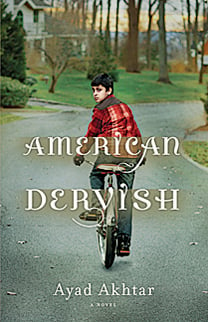 On her deathbed, Hayat Shah’s auntie Mina, a devout Muslim, lay reading F. Scott Fitzgerald’s letters. She pointed out this passage to Hayat: “The test of a first-rate intelligence is the ability to hold two opposing ideas in mind at the same time and still retain the ability to function.” Mina is herself a paradoxical character—pious yet enlightened, submissive yet intrepid. When she first came from Pakistan to rural Wisconsin to live with the Shahs, Hayat is 10, at sea in the messy mix of fealty and betrayal that comprised his parents’ marriage, pulled between his needy mother and commanding father. Mina, with her unwavering devotion to Islam, offers Hayat a welcome anchor. As the two settle into nightly readings of the Quran, Hayat begins to experience the world more viscerally, from the stippling of trees with turning leaves to the vivid feel of cotton on his skin. Unable to find security in his family, Hayat finds something else to be certain of: God’s majesty.
On her deathbed, Hayat Shah’s auntie Mina, a devout Muslim, lay reading F. Scott Fitzgerald’s letters. She pointed out this passage to Hayat: “The test of a first-rate intelligence is the ability to hold two opposing ideas in mind at the same time and still retain the ability to function.” Mina is herself a paradoxical character—pious yet enlightened, submissive yet intrepid. When she first came from Pakistan to rural Wisconsin to live with the Shahs, Hayat is 10, at sea in the messy mix of fealty and betrayal that comprised his parents’ marriage, pulled between his needy mother and commanding father. Mina, with her unwavering devotion to Islam, offers Hayat a welcome anchor. As the two settle into nightly readings of the Quran, Hayat begins to experience the world more viscerally, from the stippling of trees with turning leaves to the vivid feel of cotton on his skin. Unable to find security in his family, Hayat finds something else to be certain of: God’s majesty.
But Hayat’s new-found bliss is hampered by his burgeoning sexuality—focused, uncomfortably, on Mina—and by Mina’s deepening attachment to Nathan, a Jewish colleague of Hayat’s father. When Hayat witnesses Nathan being shunned, he confuses faith with anti-Semitism and finds an excuse to interfere with Mina’s life, to predictably disastrous effect.
Akhtar’s first novel provides a rare and authentic window into the richness and turbulence of children’s inner lives. Hayat misses not a beat in the weird, if well-intentioned, ways of the grown-ups in his life. His own religious conviction ebbs away as he suffers through remorse for his behaviour and horror at Mina’s lot in a new marriage. He has a second epiphany of sensation—this time when he lets go of his faith. But Mina’s death leads him back to the Quran, this time à la Fitzgerald—accepting its contradictions and finding solace in its essence.